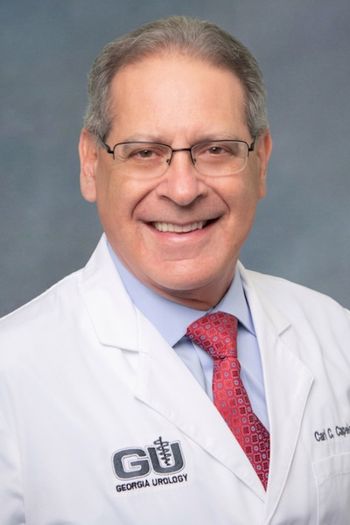
Triplet therapy was viewed as particularly appropriate for younger patients, those with high-volume metastatic disease, or those with aggressive clinical features.

Triplet therapy was viewed as particularly appropriate for younger patients, those with high-volume metastatic disease, or those with aggressive clinical features.

A recurring theme was the debate between upfront combination therapy and sequential escalation.

The forum underscored the importance of multidisciplinary collaboration in managing advanced prostate cancer.

A key theme throughout the forum was the importance of assessing disease volume and clinical presentation at diagnosis.

When discussing treatment goals, clinicians underscored the importance of individualizing systemic therapy.

The group agreed that the future of NMIBC treatment depends on biomarkers that can direct patients toward the therapy most likely to work.

The group discussed wide variation in when and how patients transition from urology to medical oncology.

Clinicians noted that symptoms—bone pain, declining function, anemia, and renal compromise—carry significant weight when choosing therapy.

A major portion of the discussion focused on selecting among ARPIs for use with ADT in the mCSPC setting.

Clinicians noted that the goal of initial therapy is to extend survival while maintaining quality of life, a balance that requires close communication with patients and multidisciplinary coordination

Panelists emphasized that the decision between doublet and triplet therapy must be individualized.

A major focus of the discussion was the growing role of darolutamide (Nubeqa) in the management of mCSPC.

The group agreed that treatment selection for intermediate-risk NMIBC remains a gray area, with decisions often guided more by clinical nuance and patient factors than by strict adherence to risk tables.

Discussion focused on patient selection and clinical scenarios where mitomycin for intravesical solution might be particularly valuable.

The group emphasized that nephron-sparing surgery is now a cornerstone of care for patients with solitary kidneys, borderline renal function, or limited tumor burden.

Attendees highlighted that the standard of care has definitively shifted from androgen deprivation therapy (ADT) alone to combination therapy, leveraging the power of novel androgen receptor pathway inhibitors (ARPIs).

The discussion underscored that management of metastatic hormone-sensitive prostate cancer (mHSPC) is no longer defined by a single standard approach.

A focal point of the discussion was the ARANOTE trial, which examined darolutamide plus androgen deprivation therapy (ADT) vs ADT alone in men with metastatic hormone-sensitive prostate cancer who had not received chemotherapy.

The discussion opened with how clinicians interpret intermediate risk in non–muscle-invasive bladder cancer (NMIBC)—a category that can encompass multifocal low-grade Ta lesions, solitary tumors larger than 3 cm, or recurrent low-grade disease within 1 year.

The group agreed that the intermediate-risk space is where decision-making is most nuanced.

In this episode, Gregory E. Tasian, MD, MSc, MSCE, Jonathan S. Ellison, MD, and patient partner Annabelle Pleskoff reflect on the origins, design, and key findings of the PKIDS trial.

Panelists discussed how they might incorporate chemoablation into clinical workflows.

Several clinicians observed that patients often fail to understand the distinction between non–muscle-invasive bladder cancer (NMIBC) and muscle-invasive disease, complicating counseling and referrals.

There was a consensus that soon, combinations like darolutamide plus androgen deprivation are becoming standard options for certain patient populations.

A key theme throughout the discussion was the importance of personalized treatment strategies based on patient-specific factors.

Catch up on exclusive videos you may have missed from the first half of the year.

The conversation touched on risk stratification, which plays a central role in deciding among surgical options.

A major challenge addressed in the Clinical Forum was managing BCG shortages and the implications for patient care.

This Clinical Forum event provided a comprehensive overview of the current landscape in treating non–muscle-invasive bladder cancer (NMIBC).

The Clinical Forum underscored the importance of clinical trials and multidisciplinary collaboration in advancing bladder cancer care.

Published: August 9th 2021 | Updated:

Published: October 11th 2021 | Updated:

Published: March 14th 2023 | Updated:

Published: February 9th 2022 | Updated:

Published: October 10th 2024 | Updated:

Published: June 21st 2021 | Updated: